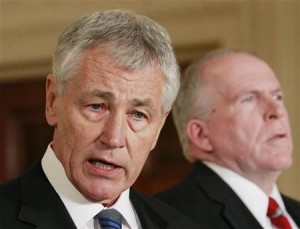 Ex-envoy to US Rabinovich's remarks come hours before vote on Hagel appointment; says Hagel sends wrong message to Iran.
Ex-envoy to US Rabinovich's remarks come hours before vote on Hagel appointment; says Hagel sends wrong message to Iran.Former senator Chuck Hagel is a "bad choice' for US Secretary of Defense, not because of his attitude toward Israel, but because of the message his appointment sends to Iran, former ambassador to the US Itamar Rabinovich said Tuesday.
Rabinovich's words to the annual meeting in Jerusalem of the Conference of Presidents of Major American Jewish Organizations came just hours before the US Senate's Armed Services Committee�was scheduled to vote�on Hagel. Hagel has been accused of being soft on Iran because he voted against sanctions as a senator and has come out in the past against pre-emptive military action to stop Tehran's nuclear march.
Rabinovich, who Yitzhak Rabin sent to Washington as his ambassador in 1993 and who served until 1996,� said that without a credible military threat against Iran, sanctions and negotiations will not work. He said that the nomination of Hagel and John Kerry as Secretary of State sent the wrong message to the Iranians.
Rabinovich said that while he appreciated Hagel's service in Vietnam, he was not a good choice to head the Pentagon "especially in the Iranian context, it undermined the idea of a credible military threat."
Rabinovich, on a panel that included three other former ambassadors to the US � Moshe Arad, Moshe Arens and Sali Meridor -- said that when US President Barack Obama arrived in March it would be important to create a "sense of movement," a sense that "things are not frozen,"� on the Palestinian track." He said he was among those who does not believe that a final agreement with the Palestinians was currently possible, but that this did not mean the status quo should be accepted. Rather, he said, there was a "large space" between the status quo and a final agreement, and that it was within that space that the discussions should take place.
The former envoy said that "mutual trust" was the most important ingredient in the relationship between any US president and Israeli prime minister, and that the mutual trust was not there for the last four years. The most important achievement of the Obama visit, he said, would be if that mutual trust could be rebuilt. .
Sali Meridor, who served as ambassador to Washington from 2006 � 2009, said the trust between Obama and Netanyahu "can only be repaired by deeds," not by talk. He said doing so was highly important, "but will take a lot of work.'
Regarding the Palestinian question, Meridor said that while a comprehensive agreement did not seem likely in the current situation, the US and Israel will have to work out whether to focus on "active conflict management," and steps on the ground to alleviate the situation, or to reach a "no-war" agreement, that will fall short of a peace accord but win the acquiescence of Hamas.
Moshe Arens, ambassador to the US for 12 months in 1982-1983, said there was no other country in the world with as closes a relationship with the US as Israel. Arens said while the two countries share the same strategic goals, as a result of shared values and ideals, they do have different opinions on how to reach those goals.� The best way to solve those differences, he said, was to go by the following rule: If something is of utmost, life and death import to one country, the other will defer.
"Take the peace process," Arens said. "There is no denying that the concessions that Israel will or will not be prepared to make is of utmost importance to Israel. These are life and death issues, nobody can deny that. It is important to the US as well, but not of utmost import � the fate and future of the US does not depend on progress in the peace process."
That rule, followed for many years, changed during Obama's first tenure, Arens said. He added that what was often forgotten in Israel, however, was that the US-Israel relationship is not just between the White House and the Prime Minister's Office, but is also with Congress, the public and the media. And in all of the various layers of the relationship, he maintained, "I think we are doing pretty well."
By Jerusalem Post
The Iran Project is not responsible for the content of quoted articles.










